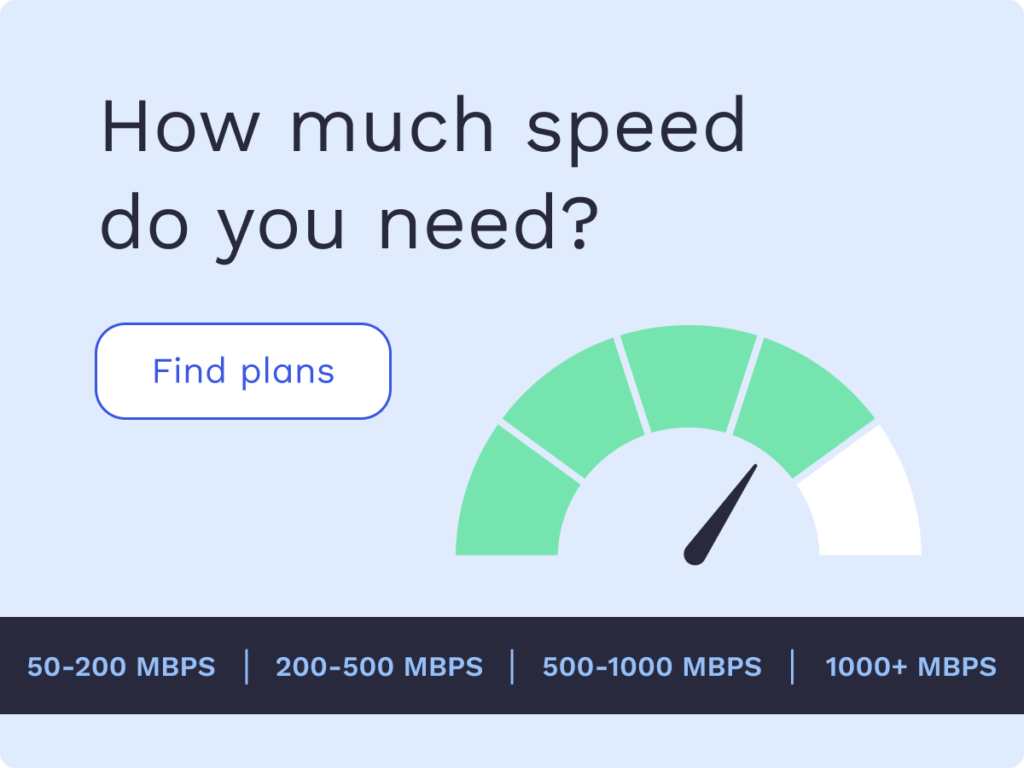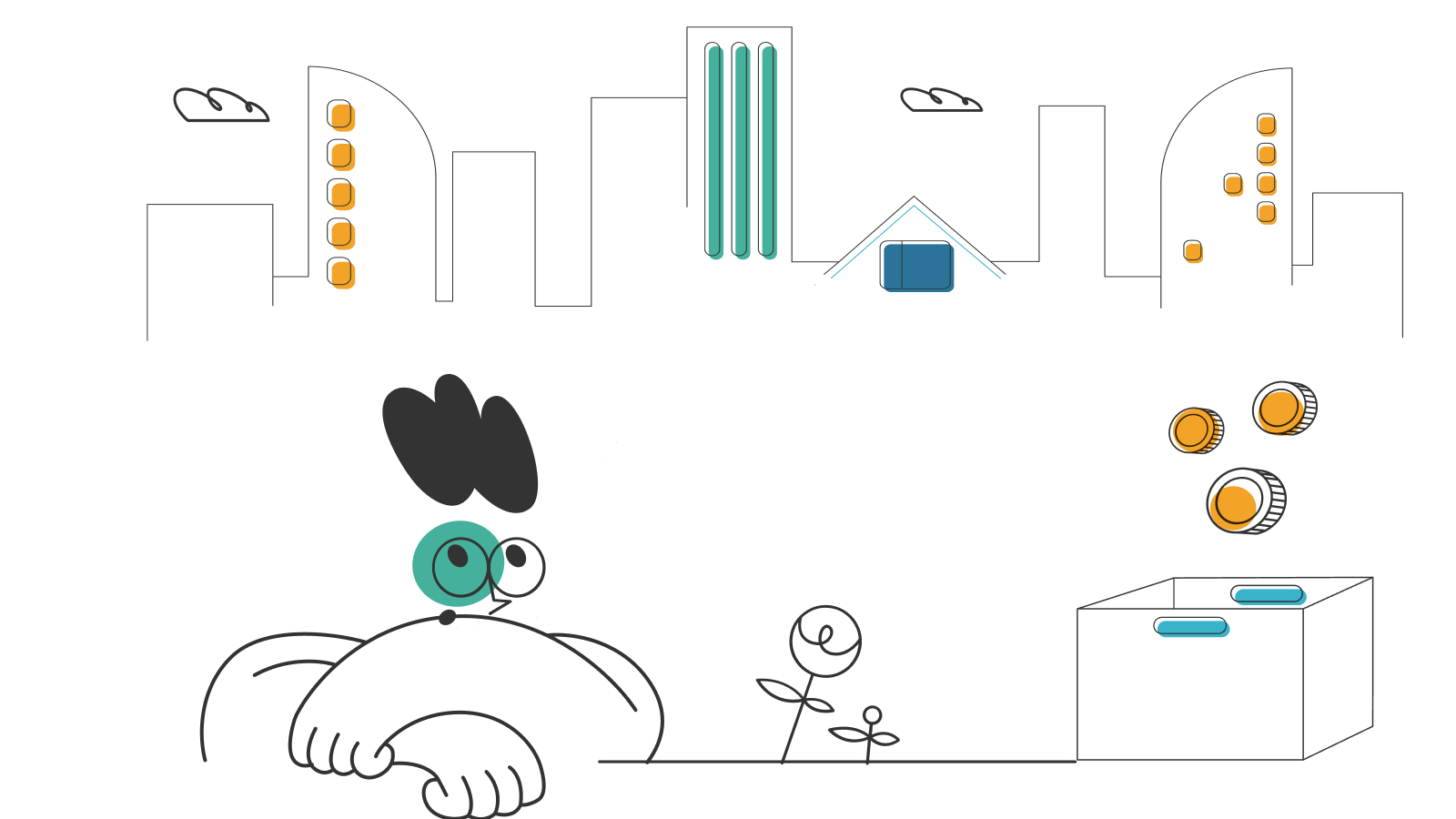What’s the Difference between Mbps and MBps?

Today, everyone wants a fast, reliable internet connection, and internet service providers (ISPs) are competing against each other to gain more customers. While most people are aware of their internet specifications, some don’t even know what speed or bandwidth they are getting from their ISP.
No matter which ISP you have service with, you’re subscribed to a particular plan that charges you for a certain amount of bandwidth. When it comes to bandwidth, there are two types of units used to represent it. You may have come across the terms megabits per second (Mbps) and megabytes per second (MBps). Although they look and sound the same, they are quite different from each other.
How are these two terms different and why is it important for you to know about them? We’ve answered this question and much more in our comprehensive guide to Mbps vs MBps.
- What does Mbps mean?
- What does MBps mean?
- What are bits and bytes used for?
- How Mbps and MBps are different
- How do Mbps and MBps affect online activities?
- How to convert Mbps to MBps
- Why is Mbps to MBps conversion important?
- How many Mbps do you need?
- Frequently asked questions (FAQs)
What does Mbps mean?
Mbps refers to megabits per second, and this is the most commonly used term to represent internet speed. For instance, if you have selected a plan that gives you 100Mbps of internet, this means that 100 megabits of data will be transferred between your device and the ISP in one second. The “mega” in the term refers to 1,000. A one gigabit per second (Gbps) plan equals 1000Mbps or one million bits per second.
What does MBps mean?
MBps refers to megabytes per second. When you find MBps written in place of Mbps, it means the metric being measured is megabytes per second and it is used to denote the speed with which a file is uploaded or downloaded. Considering the same example from above: If the transfer speed is 100MBps, this means that in every second, 100 megabytes of data are transferred from one location to another.
What are bits and bytes used for?
To get a better idea as to what Mbps and MBps are, it’s important to understand what bits and bytes are. By knowing the difference between them, you will be able to understand their applications as well. The common aspect of bits and bytes is that both of them are used for measuring digital information or data.
You may have heard that computers work on 0s and 1s, and while this can be quite difficult to fathom, it helps to explain what a bit is. Basically, a bit is a binary digit that can hold two values: 0 or 1. A bit represents data inside a computer or device. In computer theory, the bit also represents electrical values, with 0 being “on” and 1 being “off.” You can also consider a bit to be a very small unit, which is also why it is denoted with a lowercase ‘b’.
On the other hand, a byte is made up of eight bits that are stacked together. This means that a byte can store a lot more information. In fact, one byte is large enough to store an individual American Standard Code for Information Interchange (ASCII) character, such as a letter of the alphabet.
Bytes are used for representing memory and storage inside a computer. You have likely seen the acronyms “KB”, “MB”, and “GB”, which represent kilobytes, megabytes, and gigabytes respectively. Today, computer memory has also been extended to terabytes (TB). The following table shows you how data is measured in bits and bytes.
By looking at this table, you must be wondering, “why isn’t 1 Kilobyte equal to 1,000 bytes?” This is because computer memory makes use of the binary system instead of the decimal system. Considering that 1 byte can be used to store an ASCII character, a 10-letter word takes up a space of 10 bytes. By the same logic, 1 Kilobyte can be used to store 1,024 characters, including spaces and special characters.
How Mbps and MBps are different
As mentioned in earlier sections, Mbps is used to represent internet speed and denotes the number of bits that an internet connection transfers to your device in one second. The higher the Mbps, the faster your internet connection will be.
However, it is important to mention that the advertised speed isn’t always what you get. There are several factors that contribute to the actual transmitted speed, including:
- Your distance from the modem/gateway/ISP hardware
- Your physical location/address
- Congestion (when a lot of users are sharing the same internet connection)
- Time of the day
- Server-side issues
On the other hand, megabytes or MBps is used to represent the speed with which files are created, saved, copied, or moved to another location. When we use MBps, we get an idea of the time in which a particular file will be transferred.
For instance, we recommend speeds of 25Mbps for streaming live TV, which does not involve downloading and saving a file. However, when downloading a video game or a movie, the rate at which you download the file might be 100MBps.
How do Mbps and MBps affect online activities?
Both Mbps and MBps are factored in when you are using the internet and downloading or uploading data. The use of the internet includes loading a website, downloading images or music files, sending emails, streaming a movie, and much more. Whether you have a 5Mbps connection or a 1000Mbps connection, you must be conscious of the time it takes for you to perform all these tasks.
Often, people who are disgruntled with their existing internet services claim that they are unable to load their favorite websites, play games, conduct video calls, or complete other tasks fast enough. This can mean one of two things: either the ISP isn’t supplying you with their advertised internet speed, or you may have an inadequate plan that doesn’t align with your internet needs.
One of the best ways to avoid this from happening is to find out how much bandwidth or internet speed you require before you choose a plan. You can do this by listing all of the devices you have in your home, or you can use an online bandwidth calculator that uses various factors and estimates how much internet bandwidth you need.
Since we are discussing the difference between Mbps and MBps, it is also important to know how these two units affect online activities. As mentioned above, the time it takes for you to download data from the internet depends on the size of the data, as well as how fast your internet connection is. There are also other factors that come into play when determining the download time, such as the connection type, whether you are connected to Wi-Fi or a local area network (LAN) cable, etc.
However, having a high internet speed doesn’t guarantee that you will have access to fast internet. If your download speed is sufficient to cover all your needs, but you are still experiencing latency, then the problem might not be with the bandwidth. The following table shows how long it would take to download different file types at various internet speeds:
As you can see, Mbps and MBps have a close relationship, and both have to be factored in to find a suitable internet speed that allows you to play online games, send and receive emails, submit documents, attend video calls, host a livestream, and more. Moreover, understanding these concepts and knowing how they relate to the online activities you routinely perform also help ensure that you get the best internet experience possible from your ISP.
How to convert Mbps to MBps
Just as 1 byte is made up of 8 bits, 1MBps is equivalent to 8Mbps. This helps you find out how many megabytes of data can be transferred per second from your internet connection. To do this, you can divide your internet speed in Mbps by 8.
For instance, if you have an 8Mbps internet connection, you will be able to upload 1MB of data in 1 second. The faster your internet connection, the faster your data transfer capabilities will be.
Why is Mbps to MBps conversion important?
Because the terms Mbps and MBps are so similar, it’s easy to mix them up. If you confuse these two concepts when trying to figure out how much internet speed you need, you might make a big error in your calculations.
For instance, if you have a 100MB file to download on a 100Mbps internet connection, it would be naïve to think that the file will be downloaded in one second. You have to notice the uppercase ‘B’ in the file size, which means that the data is in megabytes, while the speed is in megabits per second.
Considering that one megabyte is equivalent to eight megabits, you will have to multiply the download time by eight. By that calculation, a 100MB file will take 8 seconds to download on a 100Mbps connection. In our example, having to wait eight seconds instead of one doesn’t sound so bad, but you might have to wait for hours if you have a 1GB file to download.
Understandably, the conversion between Mbps and MBps can be complex and difficult to perform correctly. However, with practice, you can convert larger file sizes in no time at all.
How many Mbps do you need?
When it comes to internet speed, your ISP always advertises the maximum speed you can get in Mbps. Usually, the speed is expressed as a combination of the download and upload speed. For instance, the speed is written down as 100Mbps/10Mbps. This means you get a download speed of 100Mbps and an upload speed of 10Mbps.
To determine how much internet speed you require, you can start by putting together the average required speeds of each activity you perform on the internet. Once you are done, you will arrive at a reasonable number that will help you choose a suitable internet plan.
If you have basic internet usage, such as visiting different websites, watching videos, checking social media, and similar applications, you can make do with a connection that offers 3 to 5Mbps of bandwidth. If you are looking to perform these activities along with downloading videos and music files, you can upgrade your internet connection to a plan that offers 6 to 18Mbps. At the higher end of this range, you would be able to stream videos in Standard Definition (SD).
The key thing to remember is that the greater the internet speed, the lower the time required to transfer data.
Frequently asked questions (FAQs)
What is a Megabyte?
A megabyte is a unit of measurement that is used to represent file size. It is equivalent to 1,024 kilobytes or a just over 1 million bytes.
What is MBps?
MBps refers to megabytes per second, and it is used to measure how much data can be transferred within a second.
How is MBps different from Mbps?
Mbps refers to megabits per second, and it is a measure of internet speed. Specifically, Mbps refers to how fast data travels within one second.
Why is 1MB equal to 1,024KB?
Computer storage makes use of binary math instead of the decimal system, which is why 1MB equals 1,024KB instead of 1,000KB.
My ISP mentions speeds like 100/80Mbps. What does that mean?
Most ISPs present their advertised internet speed in both upload and download. For instance, if an internet plan shows the internet speed as 100/80Mbps, it means that their download speed is 100Mbps, while the upload speed is 80Mbps.
*Pricing varies by location and availability. Speeds may vary. All prices subject to change; for current pricing and availability visit our internet service page. Prices as of 3/23/22.
Disclosure | Updater articles are based on our own data and research, independent from partner relationships. We are not compensated by partners for information and opinions presented here. Our Editorial Terms of Service can be found here.














